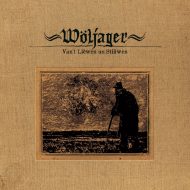 Marcel Dreckmann has become a bit of an institution over the past decade and his latest project Wöljager is destined to do the growing legend no harm whatsoever. Dreckmann, aka Skald Draugir, is better known for his main band the mighty Helrunar and his involvement with the magnificent Árstíðir Lífsins. Two bands that for whom excavating historical and mythological morsels through the medium of extreme metal is at the heart of what they do. The acoustic Wöljager takes Dreckmann’s cultural expositions into a different direction – culturally at least. This is folk music that will sound like an obvious extension for fans of Árstíðir Lífsins – but with nods to bands like Rome and Empyrium. It also has that unmistakable, warm, reverberating skaldic vocal and manages to grow with each track from solemn and reflective to an album with some subtle twists and turns.
Marcel Dreckmann has become a bit of an institution over the past decade and his latest project Wöljager is destined to do the growing legend no harm whatsoever. Dreckmann, aka Skald Draugir, is better known for his main band the mighty Helrunar and his involvement with the magnificent Árstíðir Lífsins. Two bands that for whom excavating historical and mythological morsels through the medium of extreme metal is at the heart of what they do. The acoustic Wöljager takes Dreckmann’s cultural expositions into a different direction – culturally at least. This is folk music that will sound like an obvious extension for fans of Árstíðir Lífsins – but with nods to bands like Rome and Empyrium. It also has that unmistakable, warm, reverberating skaldic vocal and manages to grow with each track from solemn and reflective to an album with some subtle twists and turns.
Van’t Liëwen Un Stiäwen (translated as “on living and dying”) is pastoral folk music that Dreckmann has written with his native Münsterland region in north-western Germany – both rural but also famous for its 100 castles (or schlösser – which is probably better translated as “chateaux”). The stated aim appears to be to set in stone, or at least in digital form, the folklore and Münsteran Platt rural dialect of the area which he says is beginning to vanish. To cap the project off, he’s also pushing ahead with a play based on his explorations and set in the late 19th century which reflects the main theme of the album – which tells the story of a clairvoyant who can only foresee wretched events.
Billed as an artistic endeavour, rather than an album, you’d be forgiven at this point for holding up your hand and asking ‘yes, yes, but is it any good?”. Well as with a lot of what might be described as ‘neo-folk’, and found in abundance on the Prophecy label, it’s more about what you put into it – because this is unlikely to blow you away on first hearing if the last thing you had on the stereo was Cattle Decapitation or Steel Panther. Moving down a gear or two first might be desirable, even essential, as well as waiting for the sun to firmly hit its last half an hour of descent and then pouring yourself and glass of merlot (or whatever the Münsteran equivalent might be).
It’s probably also worth pointing out that Dreckmann is joined in his endeavour by his Árstíðir Lífsins chums Stefan Drechsler and Árni Bergur Zoëga so the pedigree is all there. And whereas a lot of black metal-derived folk can seem quite linear or even horribly one-dimensional, Wöljager’s world begins to expand as soon as you hear the first chords. Because the sombre atmospheres conjured by Wöljager feel like a walk through the sweeping forests, fields and villages of Northern Europe with distinctly melancholy overtones.
There are no explosions here and clearly the ability to understand the dialect would be useful when the words and lyrics and so central to the whole endeavour. The track Vettainachtain, for example, sounds like the foretelling of a National Socialist rally and Dreckmann begins with Dreckman uttering the words: “Vaterland. Was ist vaterland….’ and I would like to hear where someone with a passion for his own perception of culture but also a depth of sensibility goes with that particular train of thought. But what is most admirable is Dreckmann’s vocal control and his ability to wrap you deep in otherworldly tones with only the barest use of acoustic guitars and violin. Clearly it’s important to embrace change or you risk being left behind by the rest of the world. But Wöljager’s attempt to encapsulate the fragile regional history in this way should be applauded even if it’s only a single snapshot of a dying past.
(7/10 Reverend Darkstanley)
http://en.prophecy.de/woeljager-van-t-liewen-un-stiaewen.html

Leave a Reply